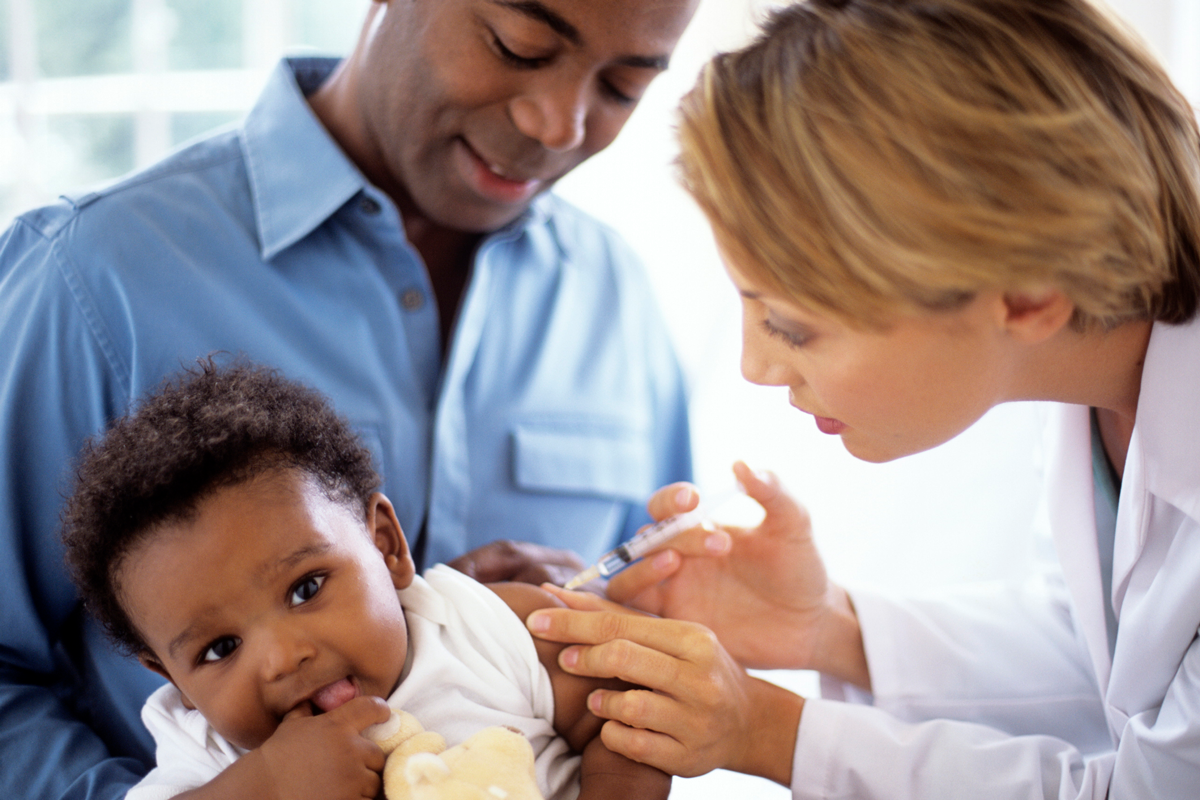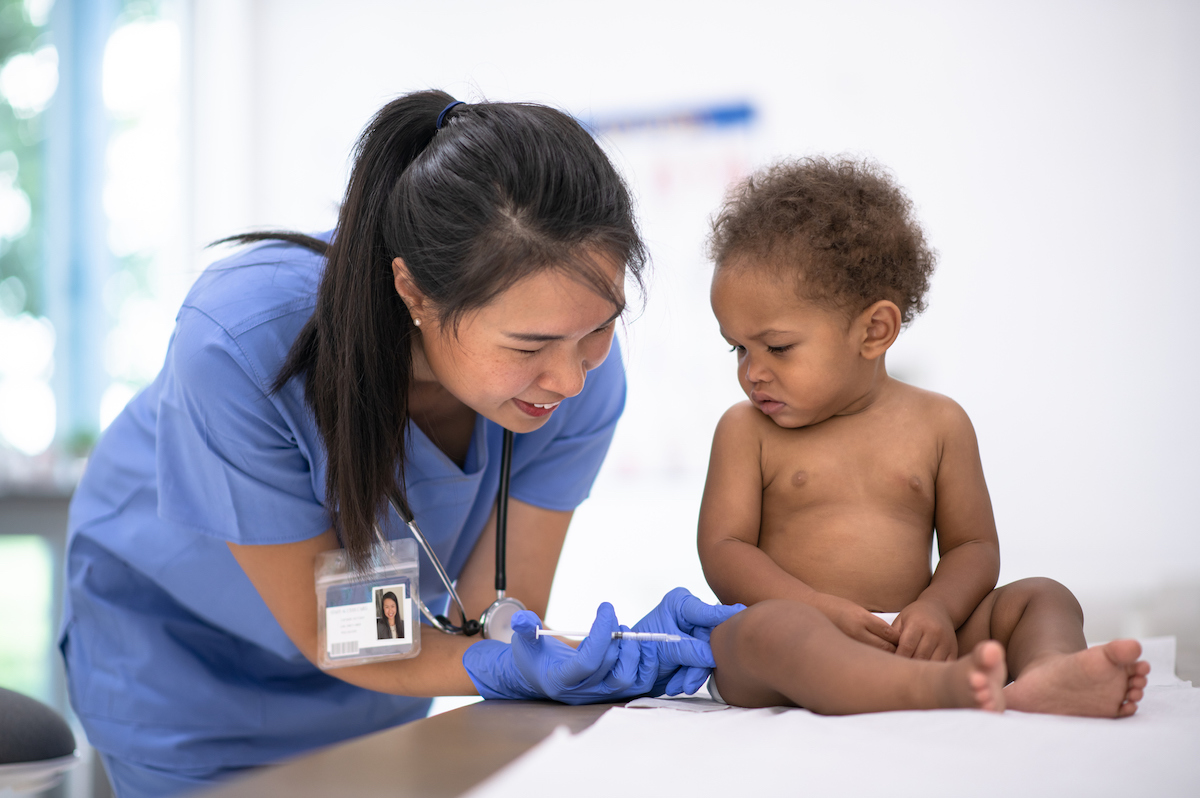Even though you’ve likely been vaccinated many times before, getting vaccines during pregnancy can feel different.
In fact, it is somewhat different, for two reasons. The first reason is that pregnancy is a form of mild immunocompromise, so there is added value to vaccination for things that might make you sick. For example: both seasonal flu and COVID vaccines are recommended more strongly for pregnant women than for non-pregnant women of similar ages.
The second reason is that vaccines in pregnancy can pass antibodies on to your infant, which will protect them in the early weeks or months of life, before they can be vaccinated themselves. Both the Tdap vaccine and the RSV vaccine are examples of vaccines that are geared toward infant protection, not parent protection.
Let’s dive into how all of these vaccines work, why they’re important in pregnancy, and what to expect when you get them.
How do vaccines work?
When you get sick, with a virus or bacterial infection, your body makes antibodies to fight back. These are proteins that recognize, attach to, and kill whatever is causing the disease (the antigens). When you recover, your body retains these antibodies — and the memory of how to make them — so it can fight back more quickly if you are exposed to the same pathogen again. Vaccines work by exposing individuals to a virus or bacteria in a way that allows them to make antibodies against the virus or bacteria without making them sick.
Generally, this is done by exposing people to a killed form of the bacteria or virus or a live but weakened version. When delivered in this way, people do not get sick, but their body, recognizing an unfamiliar invader, creates antibodies to fight it. If you are then exposed to the real thing, the actual live pathogen, you have antibodies against it and will not get sick (or not as sick).
When you’re pregnant, you share your blood with the baby, and this includes antibodies. When you’re vaccinated during pregnancy, then, this provides antibodies to the baby after birth. Those antibodies provide protection if the baby encounters the disease. An important note is that this immunity is shorter-lived than the immunity that you get, because you share with the baby only the antibodies and not the memory of how to make them. The immunity you pass on lasts about six months.
What’s the best timing?
For infant protection, the ideal timing for vaccination is in the early part of the third trimester. This is enough time for antibodies to develop but also close enough to the end that they are retained for several months post-birth. For the vaccines (Tdap and RSV) that are focused on infant protection, this is the optimal timing.
For the COVID and (especially) flu vaccine, there is a competing factor, which is protection of the parent. Flu can be quite serious in pregnancy, so there is an argument for vaccinating early. The value for the infant is also there, so the timing is not obvious. This is something that’s worth discussing with your doctor, and depends both on the exact timing of birth around the flu and COVID season and on your individual risk factors.
What vaccines do I need?
Flu
Flu strains vary over time, so each year there is a new seasonal flu vaccine, targeted to the current strain, to protect against serious illness. Generally, the best time of year to get a flu shot is in October — August seems to be too early (the antibodies wear off before the meat of the flu season), and December is too late (there are already a lot of exposures).
However, if you are pregnant, there may be value to earlier vaccination if you are due in the fall. Ideally, you’d have at least four weeks between vaccination and birth, to give antibodies time to pass to the baby. That could mean vaccination in September if you’re due in October.
It’s important to note that while the flu can be slightly more serious in pregnancy, it does not generally cause fetal complications.
COVID
Like the flu vaccine, the COVID vaccine will be reformulated every year to match circulating variants. We should expect a new vaccine every fall. COVID vaccines have been reliably shown to lower risk of hospitalization, serious illness, and death. They also have some impact on the risk of getting the disease at all.
The vaccine is recommended during pregnancy, both to provide protection to the infant (estimates suggest a 35% reduction in hospitalization risk for the infant) and because in some waves of COVID, pregnant women (especially those who were never vaccinated) have been especially affected.
That said, if you are vaccinated and you do get sick with COVID during pregnancy, you do not need to worry about this more than you would other colds or respiratory illnesses.
RSV
RSV is an extremely common virus that causes lower respiratory infection. It’s the most common cause of these lower respiratory infections in children under 1 and is a significant source of hospitalizations.
There are two great options for protecting infants in their first RSV season. The first is vaccination during pregnancy. The vaccine is given between 32 and 36 weeks, which gives time for antibodies to develop, pass to the infant, and then persist through the first months of life. The initial data from vaccine trials showed that this option was very effective in preventing disease in infants: 82% efficacy over the first three months of life. This is the preferred option if your due date falls during RSV season (November to April.)
Another option is to give protection to the infant directly. In 2023 the FDA approved an immunization for infants in their first RSV season. This isn’t a vaccine; it’s a monoclonal antibody. The core idea is that the shot delivers antibodies directly, unlike a vaccine, which induces the body to produce its own antibodies. It’s also very effective — one study found an almost 70% reduction in the risk of RSV hospitalization and an almost 90% reduction in the need for supportive oxygen. This is the preferred option if your due date falls outside of RSV season, so your infant has protection at the right time of year.
Generally, you would use either the vaccine in pregnancy or immunization of the infant, not both.
Tdap
The Tdap vaccine protects against three diseases: tetanus, diphtheria, and acellular pertussis (whooping cough). When given during pregnancy, this vaccine provides early protection to your infant, before they can be vaccinated themselves, which happens for the first time around two months of age.
It’s a highly effective vaccine. Both diphtheria and tetanus are effectively unknown outside of unvaccinated individuals; estimates suggest efficacy of close to 100% for both. For pertussis, efficacy is estimated at 98% for a year following the last dose in childhood, and 70% five years after that.
What about vaccines after the baby is born?
When your baby arrives and throughout his or her childhood, you will encounter many routine childhood vaccinations: pertussis, hepatitis B, measles. They’ve saved literally thousands, perhaps millions, of lives. And yes, they still make some people nervous.
The main thing to know is that these vaccines have been widely tested and subject to scrutiny that is far outside virtually any other medical intervention, and they’ve come out well. They’re safe, and although the diseases they protect from are rare, we do see deaths from pertussis in infants every year, and routine measles outbreaks in undervaccinated populations.
Please: get the routine vaccinations, even if they are the only ones on this list you get.
The bottom line
- When you’re vaccinated during pregnancy, it provides antibodies to the baby after birth. Those antibodies provide protection if the baby encounters the disease.
- As a pregnant person, you should get the flu, COVID, RSV, and Tdap vaccines. Once your baby arrives, it is important to get them the routine childhood vaccinations.
- For infant protection, the ideal timing for vaccination is in the early part of the third trimester. However, for the COVID and flu vaccines, the best timing depends both on the exact timing of birth around the flu and COVID season and on your individual risk factors. You should discuss this with your doctor.



















Log in
Currently 33 weeks pregnant and my pharmacist just denied me the Covid vaccine based on “updated recommendations” (looks to me like it’s just politics?) will there be an update to this guide? And is there still a way for me to get the Covid vaccine? Thanks!
Can you comment about studies that link the RSV vaccine and preterm birth? Many thanks.